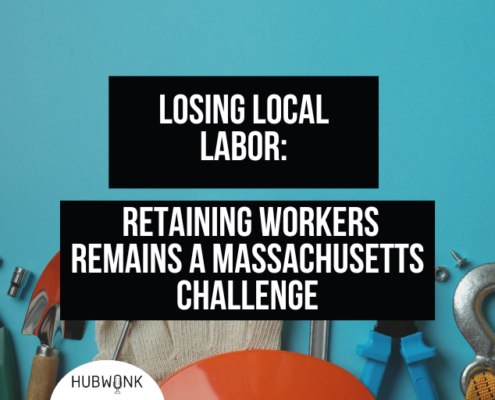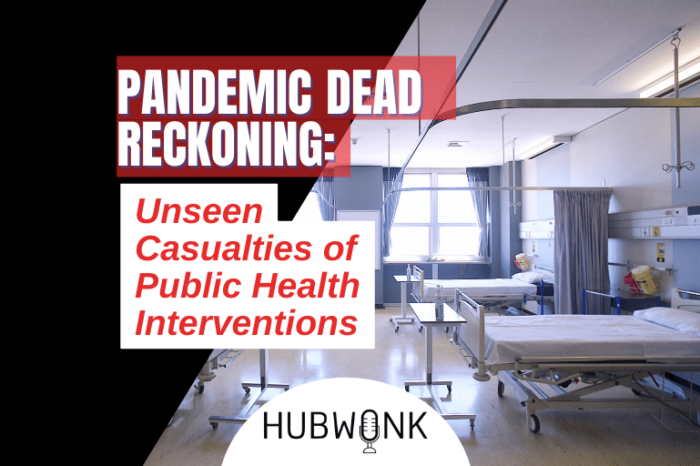Pandemic Dead Reckoning: Unseen Casualties of Public Health Interventions
/in COVID Health, COVID Life Sciences, Featured, Healthcare, Podcast Hubwonk, rCOVID /by Editorial Staff
Hubwonk host Host Joe Selvaggi talks with Pioneer Institute’s Senior Fellow Dr. Bill Smith about new evidence that during the past two years of the pandemic, there were as many unseen excess deaths from non-Covid-related diseases as seen from Covid. They discuss the need for public health leaders to pivot their messaging to address this hidden mortality.
Guest:
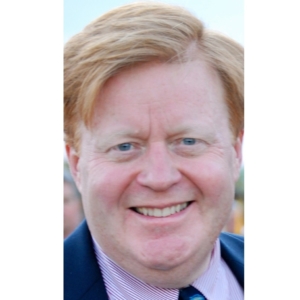 William Smith is Senior Fellow in Life Sciences at Pioneer Institute. He has 25 years of experience in government and in corporate roles, including as vice president of public affairs and policy at Pfizer, and as a consultant to major pharmaceutical, biotechnology and medical device companies. He held senior staff positions for the Republican House leadership on Capitol Hill, the White House, and in the Massachusetts Governor’s office. He is affiliated as research fellow and managing director with the Center for the Study of Statesmanship at The Catholic University of America (CUA), where he earned his PhD.
William Smith is Senior Fellow in Life Sciences at Pioneer Institute. He has 25 years of experience in government and in corporate roles, including as vice president of public affairs and policy at Pfizer, and as a consultant to major pharmaceutical, biotechnology and medical device companies. He held senior staff positions for the Republican House leadership on Capitol Hill, the White House, and in the Massachusetts Governor’s office. He is affiliated as research fellow and managing director with the Center for the Study of Statesmanship at The Catholic University of America (CUA), where he earned his PhD.
Read a Transcript of This Episode
Please excuse typos.
Joe Selvaggi:
This is Hubwonk, I’m Joe Selvaggi.
Joe Selvaggi:
Welcome to Hubwonk, a podcast of Pioneer Institute, a think tank in Boston. As the grim milestone of 1 million US COVID 19 deaths approaches new data reveals that as many people have died from the effects of the pandemic as have from the disease itself. This remarkable observation that the unseen deaths were equal to the number seen was not made by public health leaders at the CDC, but rather by actuarials of the life insurance industry, those experts tasked with measuring mortality rates to price, policy risks. Their analysis found in nearly 40% spike in year over year deaths from 2019 to 2020, but determined only half of those excess deaths were from COVID. These data suggests that the societal public health reaction to the virus, including mitigation and messaging strategies caused as many deaths as COVID 19. Now, as vaccine and acquired immunity have substantially reduced. Those seen COVID deaths, is it time to change our focus toward the unseen excess pandemic deaths to begin to subside that may last far longer and claim more lives than the COVID 19 virus itself?
Joe Selvaggi:
My guest today is Pioneer Institute’s senior healthcare fellow, Dr. Bill Smith. Bill has recently written extensively on the unintended and largely unnoticed consequences of pandemic mitigation measures. He has discovered substantial evidence that changes in individual behavior, such as foregoing medical screening, checkups, and chronic illness treatment have inevitably led to an increase in excess death. Bill will share his views on the failure of health leadership to use their high profile platform, to anticipate and address elevated risk from other human diseases and offer his thoughts on immediate steps. Healthcare leaders must take to stand the rise in non COVID pandemic related deaths. When I return, I’ll be joined by pioneer institutes, Dr. Bill Smith. Okay. We’re back I’m Joe Selvaggi. This is Hubwonk, and I’m now joined by Pioneer Institute senior fellow Bill Smith. Welcome back to Hubwonk, Bill.
Bill Smith:
Thank you, Joe. Glad to be here.
Joe Selvaggi:
Well, bill, it’s good to have you because we’re gonna cover a topic that we’ve covered quite a bit in the past. Of course it’s gonna have to do with COVID. But something that you and I have a little alluded to several times is that our focus on COVID and there’s a lot of other ways that people lose their lives or die. And just this past week in the Wall Street Journal, I saw two articles that really spoke to you are in my conversation about these excess deaths that are unrelated to COVID. In fact it was a piece entitled rise in non COVID. 19 deaths hits life insurers. They’re the people who pay out. They pay a lot of people to actuarials, a lot of money to actuarials, to decide how many people are likely to die in any given year.
Joe Selvaggi:
It’s fairly consistent. And suddenly we see a spike. One of the statistics side was a spike of 40% excess deaths in the us in, during COVID relative to years without COVID. So let’s start our conversation there. We’ve got 40% increase. Some of that has to do with COVID and some of it has to do with non COVID. So let’s start with you. You’ve recently had a presentation on this issue. So I’m gonna let you carry the ball and talk about COVID deaths relative to all the other ways people die in a given year.
Bill Smith:
Yeah, Joe. So I, you know, during 2021, I, I started, I, I constantly reading healthcare and life sciences blogs, and I kept noticing articles indicating that the, the number of people that were getting screened for traditional diseases, cardiovascular disease cancer, diabetes go down the list, even mental health, the number of screenings that were happening were just dropping through the floor. People were not going to the doctor. Primary care visits were down 20%. And so people weren’t getting blood pressure screenings, weren’t getting A1C screenings for, for blood sugar, weren’t getting cholesterol screenings. And so I wrote this paper as fall, where I, let me just read one line. I’m not gonna bore your listeners. But I basically said the difficult question that should be asked is did public officials create such a climate of fear around COVID that they neglected to encourage people to visit their physicians and receive regular screenings for chronic conditions.
Bill Smith:
And, and I think the question I raised is now coming home to roost the life insurers in this, in this wall street journal article are starting to report their earnings. And they’re not only paying out life insurance payments because of COVID deaths. They’re paying a lot out because of non COVID deaths. And the actuaries attributed this to the fact that people aren’t getting screenings or didn’t get screenings in 2020. And so their conditions got worse and their conditions were not monitored. You know, there are many, many conditions that have caught early even cancer if it’s caught early it it’s, it can be solved and, and there might not necessarily be mortality. And I think what we’re seeing is that that a lot of things were not being caught early.
Joe Selvaggi:
So let’s put this in perspective. I wanna put some, a fine point on, cause you do a nice job of quantifying. Let’s say how, how people died in 2020. COVID we hear a lot about the 375,000 people who died in 2020 of COVID. That’s a terrible number. Every one of the, every one of those lives is a tragedy, but in the same year, 691,000 deaths from cardiovascular disease, 600,000 deaths from cancer, 160,000 stroke and a hundred thousand diabetes death. If those conditions are not properly diagnosed and treated, if all those numbers go up suddenly it starts to eclipse even the large COVID death. Essentially. That’s what we’re talking about right now.
Bill Smith:
Yes, that’s what we’re talking about. And you know, I it’s a little bit of Monday morning quarterbacking public health officials had a very difficult challenge with COVID. It was a virus they hadn’t seen before. They didn’t know how, how dangerous and lethal it was. So I don’t wanna criticize them too much, but you should do Monday morning quarterbacking because you wanna see how you, how you perform poorly in the last game. And I think public health officials perform somewhat poorly in not reminding people to go get screened for traditional chronic conditions. You know, Anthony Fauci was on TV probably a thousand times during 2020. And I don’t recall him ever saying he, he talked a lot about vaccines and I’m I’m big on vaccines. But he, he, I don’t recall him ever saying, you know what, people shouldn’t ignore that traditional diseases that can kill them, go to the doctor and get screened, wear a mask social distance while you’re in the doctor’s office, but go to the doctor. And, and, and I didn’t hear a lot of public health officials saying that. And again, it’s Monday morning quarterbacking, but they, they should have been saying that because I think that the drop in screenings is having a, a devastating effect.
Joe Selvaggi:
Well, you even put a, a number on the drop in and screenings. You, you cite in 20, 20 alone primary care visits down 21% in the second quarter blood pressure screening down 50% cholesterol screening down 37% telehealth surge, 35%. And this podcast has been a big advocate of telehealth, but of course, telehealth can only do so much at this point we can’t, it, it can’t lay hands on a patient and can’t reach through the screen and, and screen you for so many of the other things that that can kill you. You also measure the the drug decline. In other words, those, those drugs that people take to mitigate these, these diseases such as well, I’ll let you go through, we talk about hypertension, we’re talking about all, all sorts of cholesterol medicine. So let’s go through those one at a time. Let’s talk about hypertensive. What, what kind of declines did we see with people addressing their high blood pressure?
Bill Smith:
Yeah. Again, hypertensives are cheap, generic medicines largely. So they’re not, not, they’re not expensive for patients to go get and they, they can be effective. There are some very good generic anti hypertensive medicines and sales worldwide of hypertensive medicines dropped almost 10% in 2020. And, and that, that shouldn’t be happening. I mean, I, I think with lockdowns, I, I think obesity and, and health problems that would cause hypertension probably accelerated. And yet you had declines in the sale of medicine. We saw a similar decline in atorvastatin. I think the, the Jamma did a study of the top 10 drugs in, in the United States and how their sales declined in during COVID and atorvastatin, which the brand name is Lipitor, but it’s now a generic is one of the most commonly prescribed drugs in the United States. And again, prescriptions for atorvastatin were down about 10%, which translates into 10 million prescriptions or more. So there were 10 million prescriptions for cholesterol lowering drugs that didn’t happen. And so you, you gotta think that this is gonna have some implications for cardiovascular disease. And, and I think the article in the journal the other day indicated that it has that, that, that cardiovascular disease accelerated in 2020, cause people weren’t diagnosed, weren’t getting medicines and weren’t being treated.
Joe Selvaggi:
So so in other words, we, we thought, okay in 2020, we’re focused on COVID as, as we should be, but we’re neglecting all these other reasons that people need to care for. So again, I tell you some St that you’re, I guess, fair to say twice as likely to dive a heart attack in a given year, then in the worst year of, of COVID. Well, one needs to take precautions if, if vaccines are around but one should pay at least as much attention to the other ways. We’re talking about things for heart attacks things for cholesterol, as you mentioned the data is clear that we all got a little bit fatter during this lockdown. So our, our hearts had a little more stress. Perhaps we were out there exercising a little less, I know running I’m a distance runner running with a mask made me less likely to put on the shoes. Yes. So we exercise less eight more and at all, all the while didn’t take our blood pressure medicine, our cholesterol medicine, and, and all of these these kinds of things. What, what else can you say? What are some of the other you mostly seem focused on heart and heart related. How does one in a sense hedge their beds against the, the dreaded killer of cancer? How, what could, what more could we be doing or could have been doing during the, the lockdown to address cancer?
Bill Smith:
Y yeah, Joe, honestly I, when I started the paper, I initially had the ambition of looking at all the major screenings and declines in all the major screenings. And the data was so overwhelming because cancer, diabetes, you name it every, every therapeutic area where there are diagnostic screenings had declined. And, and I just thought the subject matter was too voluminous to put in one paper. So I limited it to cardiovascular disease largely because CV disease is, is the number one killer. So I, I wanted to look at how diagnostic tests, but I seen anecdotal articles and studies. I about declines in mammograms, in A1C tests for, for diabetes, for mental health screenings, for in every therapeutic area, there were great declines. And you know, you know, what the traditional screenings are when you go get a physical for cancer, you get, you get a prostate screening. If you’re a man, you get a mammogram, if you’re a woman. And, and those, my, my strong sense. And I only, again, I didn’t Chronicle this into study, but my strong sense is those screenings decline dramatically.
Joe Selvaggi:
Yes, indeed. And again, you and I talked about an article. This is, we haven’t had my much time to digest this article. It came across R wire on the us news and world report talked about what, what seems in hindsight somewhat obvious threat to health is the spike in maternal death rates in, in 2020. And it’s very, it’s dramatic 40 an increase of maternal death, 44% in one year over the year compared earlier, let me see if I have that right. Yes, 44%. And again, I, I I’ll add some literal, some color to this that spike was not amongst non-Hispanic white women. They saw almost no spike. This was almost entirely amongst mothers expecting mothers of Hispanic or, or, or black. So this is a spike in the least or I would say the most vulnerable populations they perhaps were the ones most likely to avoid routine care or, or checkups that is so needed when one is expecting a child. Can you say anything about that and how it, it dovetails well with your, with your overall thesis?
Bill Smith:
Yeah, it’s, it’s a, it’s another story that similar to so many stories that just seem to be coming out about 2020 that the normal course of healthcare event. So if you’re a expected mother, my, my wife was constantly going to the doctor for prenatal visits and getting prenatal vitamins and doing all of those things that that mother expected mothers do. And it looks like there was a serious decline in the number of prenatal visits, which led to as particularly health disparities for Hispanic and, and black mothers expecting mothers. This is just at this point, it it’s just another area O of the healthcare system, where we saw such major declines in the preventative medicine that should have been happening. That again, I, I have to hold public health officials to task on this because they, they weren’t reminding people to go to the doctor.
Bill Smith:
They were constantly talking about vaccines and social distancing and masks. You couldn’t get away from that on the news when a public health official would appear, but I don’t ever recall them saying, you know what, go back to the doctor for your regular visits, because there’s a lot of, of things that should be happening to prevent worse outcomes in traditional disease areas. And, and I just don’t remember public health officials talking about that. And I think we’re starting to see the evidence roll in that, particularly in 2020, the, the decline in the number of diagnostic screenings that was happen has increased mortality in a variety of areas.
Joe Selvaggi:
Yes. I think particularly at this moment in time, again, we, we can do the money more quarterback is that, that’s how you describe it or some sort of reckoning and say, look, we should have done X instead of Y. But I suppose that’s water under the bridge right now on one has to assume now that we’re somewhat much more highly vaccinated and we’ve gone through this Omicron wave with you know, we’ve decoupled cases from deaths. We have a relatively low death rate when compared with, with infection cases. So I will say we’ve licked COVID, but it’s come down to very, very small numbers of deaths. One to assume the spike in deaths from a lack of care that happened in 2021. If people aren’t, you know, aren’t ready to roll their sleeves and get back to their doctor and get their screening. I would imagine this spike in non COVID or COVID related death or non COVID related deaths is gonna continue well after COVID is, is, is long gone. In other words, if you miss cancer today, you get it tomorrow. That, that excess mortality is gonna appear in next year or the following years numbers. Is that fair?
Bill Smith:
I think that’s right. I think that’s right. We’re gonna continue to see these spikes. And you know, again, not to carry the football analogies, but I don’t wanna spike the football in this and say I was right. We should have been talking about this, as I said, in my paper last year, but public health health officials should now say, okay, COVID is declining. People need to get back to the doctor and get screened. And there should be a, a, a, just a an entire campaign on the part of public health officials to remind people about the traditional diagnostic test that they should be getting. I, I, you, when I was writing the paper, there’s, there’s, there’s an agency, a federal agency called the us preventative healthcare task force. I think that’s the name. I forget the acronym, but it’s, it’s basically a bunch of voluntary physicians who come together and they suggest diagnostic tests that should be routine.
Bill Smith:
So they look at sexually transmitted diseases, cancer, every, every therapeutic area you could imagine. And they look at the test and they make a recommendation people above this age, for example, should get this test or that test. And, you know, I went on their website when I was writing the paper, and I’d seen all these studies with the declines in, in diagnostic screenings for all of these prominent killing eases yet the task force was making no recommendations. They were just going along with their business. They made a recommendation about chlamydia during 2021 at chlamydia screenings. I, I think they should have mobilized and said, Hey, we’re the group that’s recommending screenings. We should, they should have had a, and, and been ringing the alarm bell that these screenings that we’ve been recommending for decades are not happening. And, and there just was not, it was not an urgency in the public health community about this. And, and unfortunately we’re seeing the mortality results of that.
Joe Selvaggi:
Yes, indeed. I would say you know, it’s often been a criticism Lev it at the public health community that this terrible pandemic is made TV stars out of, out of many of them. But what you’re saying is despite their now their newfound power tension and voice that they’re not using that voice in the way that we would expect public health officials to use it. In other words, we have to prioritize based on risks and benefits with COVID now somewhat diminished in its risk and additional information, somewhat diminished in its benefit. The next, you know, marginal benefit of the advising for vaccines seems to be somewhat diminished. We really have a, a, a sort of silent killer that is killing at least as many people or more than COVID did at its peak. And, and we’re more or less ignoring it.
Bill Smith:
I, I would agree with all that. And I’d also add that the lockdowns were a killer for traditional diseases. They did simply were, you know, they kept liquor stores open. They kept grocery stores open. They should have been saying, don’t just go to the grocery store, go to the doctor and get your traditional screenings. And nobody was saying that, that I recall. So I, yeah, I think there should, there should be some Bundy morning quarterbacking going on to say, Hey, wait a minute. If another pandemic comes along, don’t lock down the whole public health community. Don’t lock down all physicians. There should be attention paid to traditional diseases.
Joe Selvaggi:
Do you see now, again, you, this is something you study all the time. We, you know, let’s hope this O Macron means the end or the end of O Macron may be the end of the pandemic. And we’re gonna have to deal with perhaps new variants that rear their ugly head. But we gonna live with this thing now. Do you see any signs, green shoots of healthcare people bringing this story to the forefront? Of course, we, we decided the wall street journal articles do public health officials have to, in a sense, take a blame, or can they just simply move on and, and realign and recalibrate their focus going forward.
Bill Smith:
I, I’m not seeing evidence that they’re recalibrating their focus and talking about this. I’m hoping the wall street journal stories and the editorial that the wall street journal wrote will instigate some change on the part of public health officials. And again, I don’t wanna engage incriminate recriminations. The, the COVID pandemic was a difficult challenge. It’s something we hadn’t seen before. But public health officials should now just say, okay, that was water under the bridge. We probably made a mistake in locking down physician offices and preventing people from getting screenings, but starting today, they should be saying, okay, let’s go back and let’s start doing the kind of things we should have been doing in 20 and 21. I, I’m hoping that somebody will say that that an Anthony Fauci or a CDC director, or somebody will say, okay, I’m, Aron’s way down. The pandemic seems to be waning. Everybody needs to go back and, and get screened for are diseases that are killing people at a greater rate than COVID
Joe Selvaggi:
Indeed. Again, I’ll take the, we’ll wrap up our conversation by bringing it back to where we began. You and I on earlier episodes of this podcast said we were concerned that this might be the case. It might be the case that fear of COVID could be killing more people than actual COVID. Now we have the actuarials at the life insurance company saying indeed you’re right. Only half of the excess tests were directly caused by COVID. The other half were by the neglect of all the other diseases that, you know, kill us every year. We now have that data it’s irrefutable and that should be the marked now for the public health community saying if it, as, as COVID receives, we have a new crisis that we need to roll up our sleeves and, and shine a spotlight directly on
Bill Smith:
That’s absolutely right. And, and, you know, the title of the paper that I wrote again, this was last year, asked the question in the title. Is there an impending, this tsunami in mortality from traditional diseases? And I think the data’s coming in that there is a, a tsunami that that’s happening and people are just dying in their fifties and sixties because they hadn’t been screamed in two years.
Joe Selvaggi:
Indeed. I think it’s a very powerful message. Very important message. I don’t understand why it isn’t the headline but who knows perhaps this, this this podcast can help move, move the ball a little bit. Where can our listeners learn more about your research? Is it published on the pioneer site?
Bill Smith:
It is published on the pioneer Institute site. And again, it’s the title of the paper is an I pen tsunami in mortality from traditional diseases. I think if you just, if you, if you Googled an impending tsunami pioneer Institute, the paper would come up
Joe Selvaggi:
Indeed. And, and these, this tsunami is gonna persist long after. COVID. I think tsunami’s a great, great analogy because it leads in its aftermath of a lot of, of a lot of suffering. For many years after the, after the wave hit, absolutely.
Bill Smith:
They think of a slow growing cancer, like colon cancer, if you’re not screened, you know, the results could show up five or six years later and, and the, the screenings are just not, they weren’t, they weren’t happening.
Joe Selvaggi:
Yeah, indeed. So, all right. That’s our call to action. And this, in fact, all our listeners should be calling their own doctors and getting those screenings taking the medicine they, maybe weren’t doing during the, the past two years and getting back on track, getting healthy maybe ho on a diet, all those good things and, move forward. So thank you for being on the show today, Bill, your always a wonderful guest.
Bill Smith:
Thank you, Joe. Thanks for having me.
Joe Selvaggi:
This has been another episode of Hubwonk, a podcast of Pioneer Institute. If you enjoyed today’s episode, there are several ways to support us. It would be easier for you and better for us. If you subscribe to Hubwonk on your iTunes podcast, catcher, if you’d like to make it easier for others to find Hubwonk, it would be great. If you offer five star rating or a favorable review, we’re always grateful. If you share Hubwonk with friends, if you have ideas, suggestions, or comments for me about future episode topics, you’re welcome to email me hubwonk@pioneerinstitute.org. Please join me next week for a new episode of Hubwonk.
Get new episodes of Hubwonk in your inbox!
Related Posts:

Breaking Down Encampments: Court Finds no Right to Sleep Outdoors
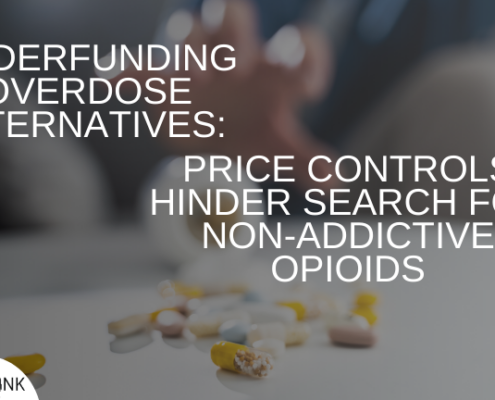
Underfunding Overdose Alternatives: Price Controls Hinder Search for Non-Addictive Opioids

Unlocking Affordable Housing: Sources and Solutions for Cost Crisis
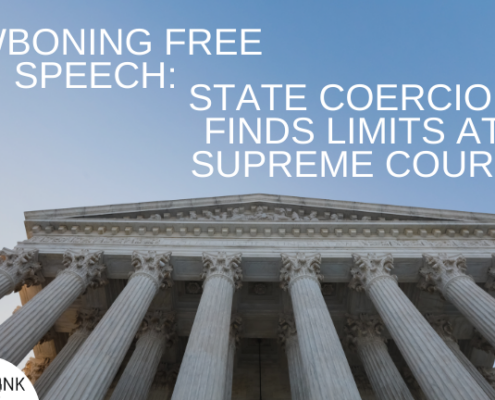
Jawboning Free Speech: State Coercion Finds Limits at Supreme Court
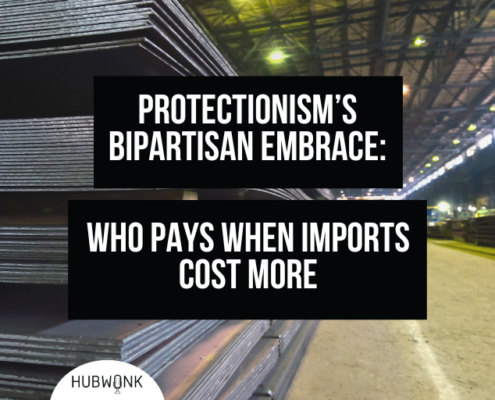
Protectionism’s Bipartisan Embrace: Who Pays When Imports Cost More
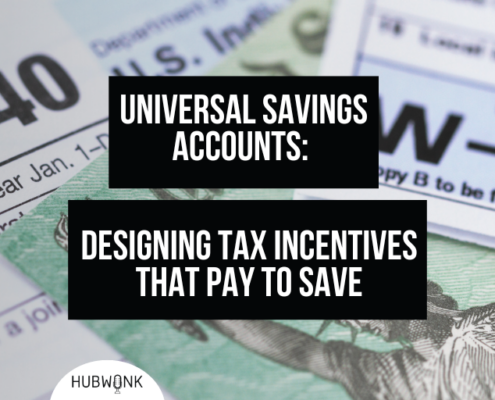
Universal Savings Accounts: Designing Tax Incentives that Pay to Save
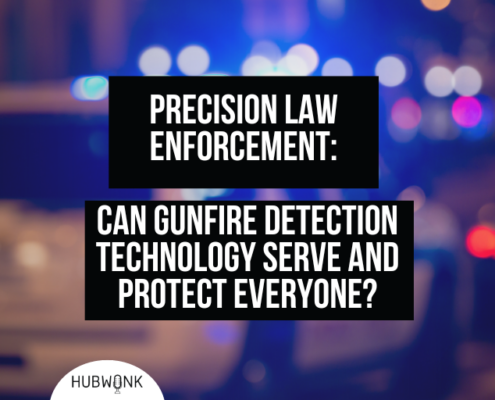
Precision Law Enforcement: Can Gunfire Detection Technology Serve and Protect Everyone?
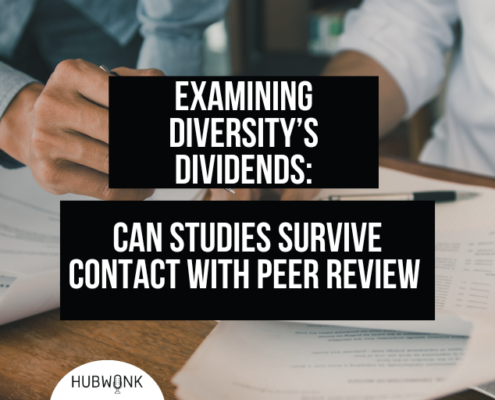
Examining Diversity’s Dividends: Can Studies Survive Contact with Peer Review
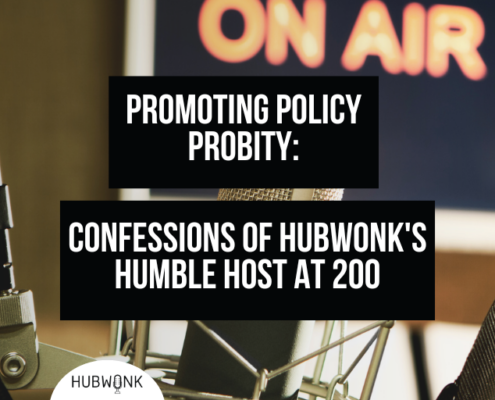
Promoting Policy Probity: Confessions of Hubwonk’s Humble Host at 200
